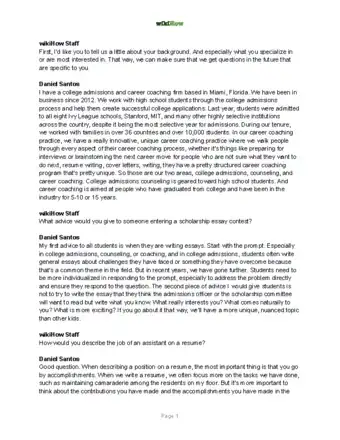This article was co-authored by Daniel Santos. Daniel Santos is a College Admissions & Career Coach and Prepory's co-founder and CEO. Prepory is a leading college admissions consulting firm that has guided over 9,000 students from 35 countries through the US college admissions process. Prepory is a member of the National Association for College Admissions Counseling and a trusted admissions counseling partner to several competitive high schools across Florida. Prior to founding Prepory, Daniel worked at various leading law firms and the United States House of Representatives. Daniel has been featured as a college admissions and career coaching expert across several major publications, including the Wall Street Journal, FORTUNE, and The Harvard Crimson.
This article has been viewed 51,195 times.
A PhD in nutrition is a great goal for anyone interested in working in a wide variety of nutrition oriented careers. A PhD in nutrition can help qualify you as a nutrition professor, researcher, administrator and/or leader in public health. Obtaining a doctorate in nutrition is a very long and involved process that requires substantial education and experience. However, with some long-term planning and dedication, you’ll be able to get a PhD in nutrition and move on to a successful and fulfilling career.
Steps
Completing the Necessary Prerequisites
-
1Obtain a bachelor’s degree in a science-related field. The first major prerequisite you’ll need is a bachelor’s degree in a science-related field. The bachelor’s degree will provide a foundation for all of the knowledge you’ll learn as a graduate student in nutrition.
- Generally, doctoral programs in this field look for completed coursework in nutrition or dietetics, so consider these as potential majors for your bachelor’s degree.
- Some programs will consider people with a wide variety of educational backgrounds. Consult the academic advisor for the programs in which you are interested in enrolling.
- A bachelor’s degree is normally the minimum educational requirement for doctoral programs. You will not be admitted unless you have one.
- Your graduate program will often require you to have at least a 3.00 GPA for admission.
- Focus on programs known for their strength in nutrition. Top programs include Boston University, Drexel University, and Hunter College at the City University of New York.
-
2Enroll in a master’s degree program, if needed. In addition to a bachelor’s degree, you might also need a master’s degree as a prerequisite for a doctoral degree in nutrition. Refer to the admissions requirements of your selected doctoral program to ensure that you are meeting all coursework prerequisites.
- Like with your bachelor’s degree, a masters in nutrition or dietetics is a good choice.
- Some programs will offer you the ability to enroll in a master’s/PhD program. This means that you can enroll as a master’s student and then move right into the PhD program. These programs are contingent on your academic success and the recommendation of your advisors.
- When enrolling in a master’s program, consider the quality of the program. If you want to enroll in a top program for your PhD, you should make sure that your master’s degree is competitive for placement into top programs.
- A master’s usually takes 2 to 3 years to complete.
Advertisement -
3Take the Graduate Record Examination (GRE). The final prerequisite you’ll need to complete is the GRE. The GRE is an exam that tests your verbal and math skills in order to determine your level of proficiency. Graduate programs, especially those in nutrition, use your scores to help them determine if you are qualified and suited for their programs.
- Highly competitive nutrition programs typically require strong GRE scores on both the verbal and quantitative sections of the GRE.
- Very good programs in nutrition and health sciences require scores higher than 1200 (in total). However, there are a number of programs that will take lower scores.
- Enroll in a GRE prep course, if necessary, to strengthen your ability to answer timed test questions.
- Schedule your test for as early in the year as you can. Testing slots book up very early, especially as spring university graduation approaches.
Exploring Potential Programs
-
1Research various university programs offering a PhD in nutrition. Once you’ve decided that you want a PhD in nutrition, you need to start searching for and researching programs that grant PhDs in this field of study. Making an exhaustive and complete search is important, as you’ll want to know all of your options before you pick one.
- An Internet search using "PhD in nutrition" or "doctorate in nutrition" will lead you to a long list of universities.
- Consult popular magazines that list the top programs at different universities around the country.
- If you prefer to stay in a specific geographic area, make a list of the universities in your region and visit their websites to find out if they offer a program that fits your needs.
- Read the program descriptions. Some programs are focused strictly on nutrition, whereas others offer specializations or combine the topic with other areas like exercise physiology or public health.
-
2Select several doctoral programs. After you’ve researched a wide variety of programs, you should begin the process of narrowing down your list and selecting a few different ones. You should narrow down your list to programs that best suit your needs and desires. Make sure to:
- Consider the cost of enrollment as well as any potential monetary assistance from the university. The average cost of tuition per year is between $20,000 and $25,000.
- Consider the physical location and the region of the program.
- Consider job placement rates from graduates of the program. Job placement often corresponds with a given program's ranking. Top ranking programs that offer a PhD in nutrition include the University of North Carolina at Chapel Hill, Tufts University, and University of Illinois at Urbana-Champaign.
- Consider the faculty and the advisor you may be working with when narrowing down programs.
- Focus on at least 3 to 5 programs.[1]
-
3Review the application requirements for each program. Now that you’ve selected a few potential programs to focus on, you need to review the application requirements of each program. This is important, as you’ll need to figure out all of the documents you’ll need to submit in with each application. Requirements typically include:
- A bachelor's or master's degree.
- High scores on the Graduate Record Examination (GRE).
- A resume.
- A personal statement.
- Letters of recommendation.
- Note the the application deadline due date for enrolling in the next school year or semester.
Applying for Doctoral Programs in Nutrition
-
1Fill out your application. When applying to the programs you’ve selected, make sure to fill out the complete application. Filling out the application on time in full will make sure your application process goes smoothly and that you are considered by the program’s admissions board.
- You will have to provide specific personal information such as your social security number, date of birth, and other identifying information.
- You will have to provide all relevant academic information such as dates of graduation, grade point averages, and more.
- You will probably have to write in your GRE and/or SAT scores, so have those handy.
- Write legibly, in black ink.
- If you can, fill out the application on your computer. This will make sure that academic advisor assessing your application will be able to read your application.[2]
-
2Prepare a resume or curriculum vitae (C.V.). Universities generally request a resume along with the application to examine your prior academic training and work experience in the field of nutrition. Based on your background, conclusions are made about your ability to make a positive contribution to the nutrition field.
- Include a professional summary at the top of your C.V. Your professional summary should give an idea of your focus in the field of nutrition as well as your experience.
- Outline your professional experience in the field of nutrition. This can range from internships to full-time jobs.
- List your educational background. This should include all degrees awarded and should show relevant coursework in the field of nutrition.
- Show any publications you might have. Publications in journals like Current Developments in Nutrition or The Journal of Nutrition will demonstrate your commitment and leadership in the field.[3]
-
3Write a personal statement. The purpose of this statement is to understand and state your professional goals, academic and professional background, your reason for choosing the specific program, and how you see yourself contributing to the nutrition field. Read the application instructions carefully as each program specifies a different content and length requirement.
- Address your interest and dedication to the field of nutrition.
- If you have an interest in a certain aspect of the field, like nutrition in developing countries, state it.
- If you already know what your research and dissertation work will focus on, explain it. In addition, if you know your research question, pose it. For instance, "What are the long-term health implications of vitamin C deficiency in East Africa?"
-
4Request letters of recommendation. There is a very good chance that the program will require you to provide several letters of recommendation. These letters are intended to provide the program admissions panel with more information about your character and work ethic.
- Be prepared to provide at least three letters of recommendation from academics or professionals familiar with your work or merit.
- Request such letters from employers, professors and colleagues who are closely familiar with your capabilities, performance and significant accomplishments.
- Personal references from family members or friends are sometimes permitted, depending on the program.[4]
-
5Submit your application packet and materials. After you’ve gathered all of the application materials, make sure to submit it. Submitting it on time and to the appropriate program representative is extremely important in making sure you will be considered for the program.
Finishing Required Academic Requirements
-
1Complete your required graduate coursework. A PhD in nutrition requires you to complete a certain number of graduate courses on related subjects. Nutrition coursework is intended to provide you with all of the basics of nutrition and to give you the tools required to help you become an expert in your subfield.
- A PhD program in nutrition usually requires completion of courses in vitamins and minerals, fats, proteins and carbohydrates.
- Other courses focus on research methods, nutritional epidemiology and nutritional assessments.
- Consult the program guide for specifics concerning required and elective courses.
- Graduate coursework for your Ph.D. will take between 2 and 4 years to complete. [5]
-
2Pass your comprehensive or qualifying exams. After you’ve completed graduate course work, you’ll need to take your doctoral qualifying exams. These exams will test you on all of the information you’ve learned in your course work. They are the final step before you begin work on your dissertation.
- Qualifying exams vary from program to program. Talk to the program advisor before enrolling.
- Your qualifying exams will most likely be scored on a pass or fail basis.
- Qualifying exams are extremely involved and usually take place over a week or longer. Depending on the program, you might test for 6 or 8 hours a day for 6 to 8 days.[6]
-
3Decide on a research topic and question, if you haven't already. Deciding on your research top is perhaps one of the most important decisions you'll make in graduate school. This decision will not only dictate the focus of your research and your academic life for the next year or two, but it will help establish you in a subfield within the broader field.
- Your topic and/or research question should be original and should make a new addition to the profession.
- Your research topic should also be feasible given your time and financial capabilities.
- Your research problem can be on a wide variety of topics, including human health and nutrition, animal nutrition, and even the economics and politics of food consumption.
- Very often, you'll narrow down research questions and specific topics with the help of your academic advisor -- a faculty member who serves as a mentor.[7]
-
4Conduct your research. Conducting your research is often one of the most exciting and interesting parts of your doctoral studies. During this phase of your PhD studies, you'll conduct studies and/or gather evidence to support the thesis of your dissertation.
- Depending on your focus, subfield, and research question, you may be required to conduct a study and work with people on a nutrition-related problem that you have picked. Potential studies could include looking at what people from different socio-economic or regional groups consume, the impact of popular foods on human health, or more.
- Depending on your focus, you may compile statistics and work with previously-existing studies.
- The research phase of your program may take up to two years.[8]
-
5Write your dissertation. The culmination of your coursework, work with an academic advisor, and your research will be your dissertation. Writing your dissertation is a prolonged process and will serve as the final achievement of your graduate studies.
- The length of dissertations vary, depending on program. Most often, though, dissertations will be from 150 pages to 250 pages.
- Typically, you will be required to defend your dissertation before a panel of faculty.
- The amount of time needed to write your dissertation will vary. It could take between 1 and 3 years, depending on your research.[9]
Community Q&A
-
QuestionWhat do I need to do to become a nutrition professor?
 Community AnswerYou'll most likely need a PhD in nutrition. In addition, you'll have to be active in your field and will most likely need to publish articles relevant to your subfield. This, though, will depend on what sort of institution you want to work at. Large state universities have higher requirements and will often only higher people will substantial amounts of published research. Community colleges, though, focus on hiring people who are well-equiped to teach.
Community AnswerYou'll most likely need a PhD in nutrition. In addition, you'll have to be active in your field and will most likely need to publish articles relevant to your subfield. This, though, will depend on what sort of institution you want to work at. Large state universities have higher requirements and will often only higher people will substantial amounts of published research. Community colleges, though, focus on hiring people who are well-equiped to teach.
Expert Interview

Thanks for reading our article! If you'd like to learn more about obtaining a doctorate, check out our in-depth interview with Daniel Santos.
References
- ↑ http://www.phds.org/rankings/nutrition
- ↑ http://www.usnews.com/education/best-graduate-schools/articles/2012/08/10/7-tips-for-completing-grad-school-applications
- ↑ https://www.winthrop.edu/uploadedFiles/cce/nutritionsampleresume.pdf
- ↑ http://www.uni.edu/~gotera/gradapp/stmtpurpose.htm
- ↑ http://www.human.cornell.edu/dns/academic/gradfaqs.cfm
- ↑ http://www.human.cornell.edu/dns/academic/gradfaqs.cfm
- ↑ http://health.oregonstate.edu/degrees/graduate/nutrition/phd
- ↑ http://health.oregonstate.edu/degrees/graduate/nutrition/phd
- ↑ http://www.human.cornell.edu/dns/academic/gradfaqs.cfm









































































